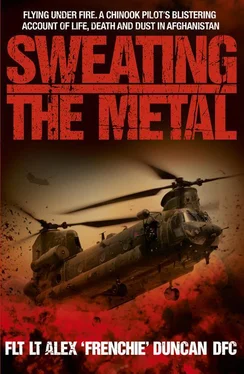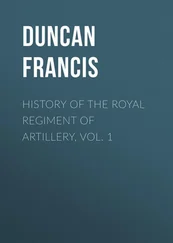I knew the chances of being hit were minute, but so are the odds of winning the lottery and people play that every week. Chance and statistical probability are all well and good, but a million-to-one chance is only relevant if you’re not the ‘one’. I couldn’t think of anything worse than surviving the fire that had been aimed at the Chinook, only to die in a random rocket attack while I was killing time, waiting for a flight home. So I resolved to do something about it.
One of the biggest frustrations for all military personnel deployed anywhere involving a flight are the movers. Sure, they have a job to do, but it’s the attitude of many of them that pisses people off. Their job is logistics and that means freight – people or cargo – and making sure that the right bit or the right person goes on the right aircraft to the right place. The trouble is they are a little bit possessive about aircraft. They always refer to them as ‘my aircraft’, like they own the fucking thing, and they come over all high and mighty and dictatorial; but bless them, they have to get their kicks somewhere. Their insecurity at never really moving outside the safety of the perimeter wire usually manifests itself in an unhelpful, aggressive manner. The default answer is generally ‘no’, regardless of the question.
As per usual, they were being no help whatsoever in my attempts to get on a C-17 to fly home. Ostensibly, it should have been a straightforward proposition. After all, the Boeing C-17A Globemaster III strategic heavy-lift transporter – to give its proper name – is one of the most modern and capable aircraft in the RAF’s inventory. It’s also by far the biggest. The cargo compartment can accommodate most large wheeled and tracked vehicles, tanks, helicopters such as the Apache, artillery and weapons. Three Bradley armoured vehicles comprise one deployment load on the C-17. The Challenger 2 main battle tank can be carried with other vehicles or it can swallow a Tornado F3 fighter jet. Several flew in and out of Bastion every week and all I wanted was space on one heading home to Brize Norton.
Again, it should have been easy because the crew area on the C-17 is pretty large too. A staircase leads up to it from the cargo deck and opens into a crew rest area behind the cockpit containing two seats and two full-size bunks, which can be curtained off for privacy. Through a doorway is the flight deck itself, again one of the largest in aviation. Of interest to me was one of the two observers’ seats directly behind each of the pilots’ positions.
I tried every avenue available from KAF, but the movers blocked my path at every turn, treating me like an idiot and saying things like, ‘Sorry sir, I can’t get you on my aircraft because there’s no room.’ Like one single body and extra kit bag would tip one of the world’s biggest aircraft over its weight limit. In the end, I did what I should have done from the off. I called the duty officer at 99 Squadron in the UK who operate the C-17 and it was sorted. One phone call and the man said yes.
That said, I hadn’t reckoned on the determination of the movers to fuck things up. I was stood at the ramp down at Bastion, dressed in uniform with my bag all ready to board, when one of the movers told me, ‘Sorry sir, you won’t be able to travel on this aircraft as they are repatriating a UK national who was killed in action last week.’
That UK national was Captain Jim Philippson.
‘I was one of the pilots involved in the mission to bring his body to Bastion last week,’ I tell him.
The mover’s face fell; it was like someone had pricked a balloon. All the bluster and self-importance seemed to rush out in a puddle on the floor.
‘Ah, sorry sir,’ said the REMF. ‘I didn’t realise you were aircrew.’ Like that should have made a difference! I didn’t have time or energy for a fight though. All I wanted now was to get home.
When the C-17’s pilot walked across the ramp, I recognised him at once. It was Guy Givens who I knew from my days at 101 Squadron at Brize. He took one look at me and smiled.
‘Frenchie mate, how are you?’
‘I’m good, mate, thanks. Been an interesting tour but I’m looking forward to getting home.’
‘Get yourself up to the cockpit then, you can have the jump seat behind me. Make yourself comfortable and I’ll be right with you.’
The sense of excitement and apprehension I felt was palpable. After what had been quite a stressful tour, I was going home to Ali and I couldn’t quite get my mind around it. It’s recognised that the guys on the front line need a break between here and home and if they’re lucky they get it in the form of ‘decompression’ – a few days in Cyprus where they get to drink, swim, fight, have barbeques and generally get all the rivalries, resentments and pent-up aggression out of their systems before going home. For everyone else, it’s front line to front room in twenty-four hours or less and it takes some getting used to.
I must have bored the tits off Guy all the way back, but I don’t think he minded. It’s one of the biggest indicators of how different things were at the beginning. At the time, there were no embedded journalists and almost nothing of what was happening in theatre was getting out. All the information so far had come from private emails between those in theatre and their loved ones at home. Eventually, things leaked out into the media, but at this point the war was really only just starting and, even within the RAF, there wasn’t a great deal of understanding of what it was like, so I was being asked all sorts of questions by the crew.
I loved that whole trip. One, because I was going home, but also because flying there in the cockpit of an RAF C-17 piloted by a mate is the best way to travel. We chatted, we caught up and then, when we were done, I unrolled my sleeping bag and lay down on a bunk to sleep. I woke up about an hour out of Brize Norton to a cup of steaming hot coffee and a full English breakfast served from the galley. It was the perfect welcome home.
It took me a while to settle after I got back, but you accrue a month or so of leave on Det due to the time you spend being operational, so I was taking things a day at a time and just enjoying being back with Ali.
After a week or so, I went over to ‘B’ Flight, 27 Squadron. They were due to fly out a few days later to take over from us in theatre. Hannah Brown had been posted to ‘B’ Flight straight from the OCF, so I wanted to see her and give her and her colleagues a heads up on how things really were on Det. It was all pretty informal. As I was back three weeks or so earlier than the rest of my squadron, they invited me over and asked me what the tour had been like. So I pulled up a bar stool and told them. When they left a few days later for the handover for their two-month stint, I felt confident that they’d have an idea of what life on the ground would be like.
Those in the military outside of the Chinook Force, particularly soldiers, tend to only notice the headline figure of our time on deployment: two months. Their tours last for six months. Some people see an iniquity there. But those headline figures hide the real truth, which is that while soldiers aren’t liable to deploy for another two years after they return, aircrew deploy every eight months. Basically, we spend four months out of twelve in theatre on a rolling basis. Some have completed eight or nine detachments now – that’s up to eighteen months of one’s life on high-density combat ops in Afghanistan. That said, I still wouldn’t trade with a soldier. They earn every penny they get and more. I have the utmost respect for what they do and the conditions they endure, but I feel a lot safer up in the air flying a Chinook.
Читать дальше












